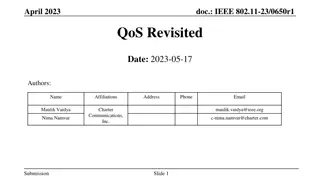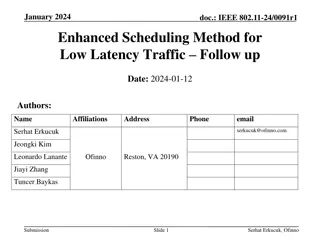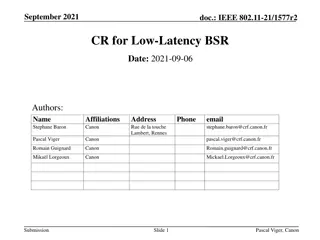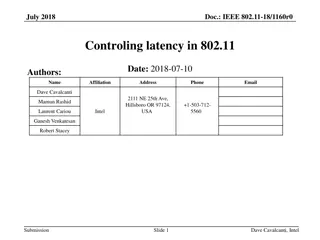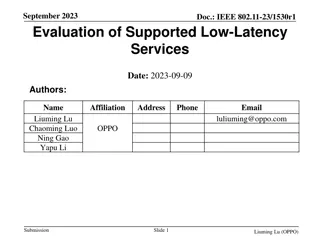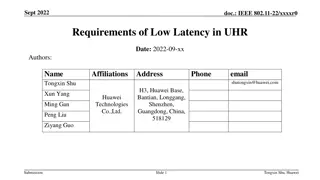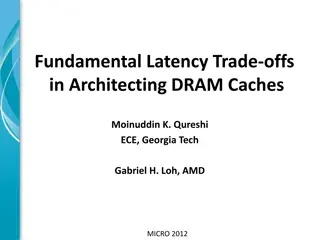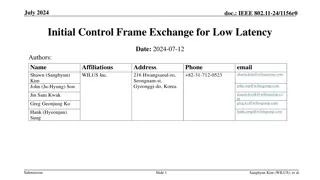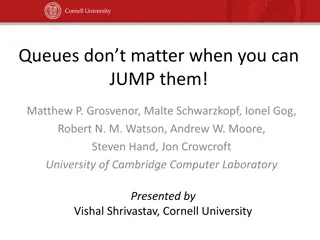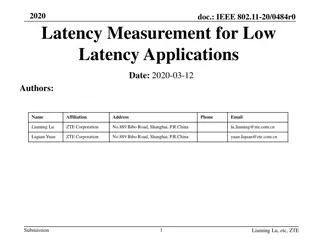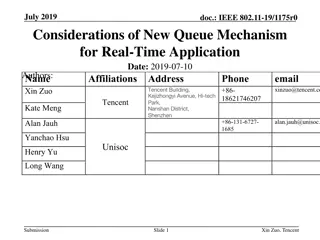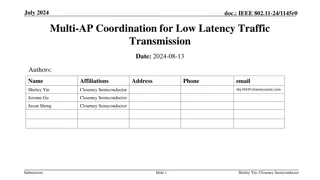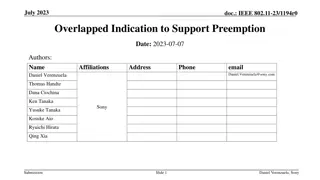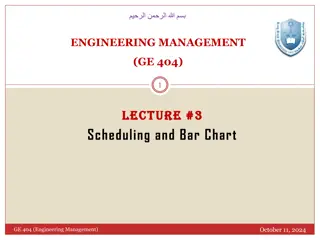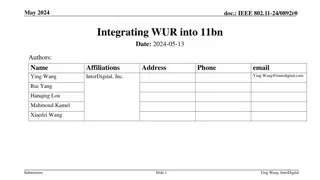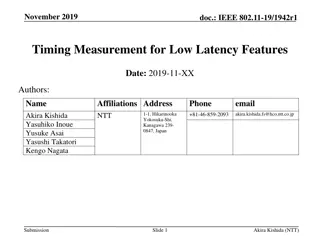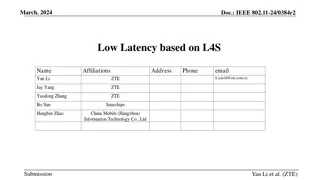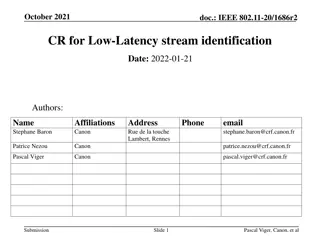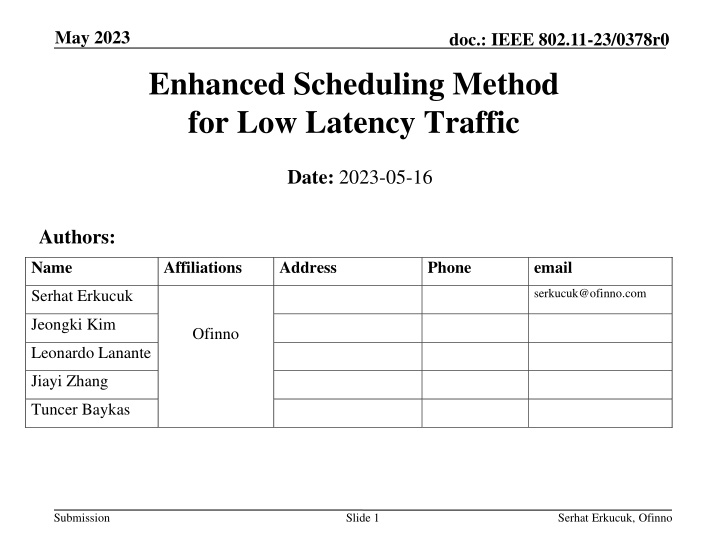
Enhanced Scheduling Method for Low Latency Traffic in IEEE 802.11-23
"Discover the latest scheduling methods for low latency traffic in the IEEE 802.11-23 standard, focusing on deterministic and event-based approaches to enhance reliability and reduce latency for various traffic patterns."
Download Presentation

Please find below an Image/Link to download the presentation.
The content on the website is provided AS IS for your information and personal use only. It may not be sold, licensed, or shared on other websites without obtaining consent from the author. If you encounter any issues during the download, it is possible that the publisher has removed the file from their server.
You are allowed to download the files provided on this website for personal or commercial use, subject to the condition that they are used lawfully. All files are the property of their respective owners.
The content on the website is provided AS IS for your information and personal use only. It may not be sold, licensed, or shared on other websites without obtaining consent from the author.
E N D
Presentation Transcript
May 2023 doc.: IEEE 802.11-23/0378r0 Enhanced Scheduling Method for Low Latency Traffic Date: 2023-05-16 Authors: Name Affiliations Address Phone email serkucuk@ofinno.com Serhat Erkucuk Jeongki Kim Ofinno Leonardo Lanante Jiayi Zhang Tuncer Baykas Submission Slide 1 Serhat Erkucuk, Ofinno
May 2023 doc.: IEEE 802.11-23/0378r0 Introduction Enabling at least one mode of operation capable of improving the tail of the latency distribution and jitter compared to EHT MAC/PHY operation, with mobility between BSSs is one of the main targets for enhancing reliabilityin P802.11bn [1] UHR contributions on latency so far can be categorized under Multi-AP operation [2 - 4] PPDU design [5 - 6] Frame overhead reduction [7 - 8] Latency improvement by AI/ML [9 - 10] Preemption/Scheduling [11 - 14] In this contribution, we consider scheduling methods for low latency traffic Submission Slide 2 Serhat Erkucuk, Ofinno
May 2023 doc.: IEEE 802.11-23/0378r0 Support for LL Traffic Deterministic low latency traffic Periodic patterns with burst arrival of packets in each interval Can be supported by R-TWT and SCS in 11be If an R-TWT scheduling AP has established SCS stream(s) described by QoS Characteristics element(s) with an R-TWT scheduled STA whose TID and Direction fields match an R-TWT TID and its specified direction for an R-TWT schedule established with the R-TWT scheduled STA, the AP should follow the rules specified in 35.17 (EHT SCS procedure) for scheduling of downlink or uplink QoS Data frames Event-based low latency traffic Non-periodic, unpredictable patterns, traffic dynamically changing Hard to schedule by AP May not be supported by existing 11be procedures (e.g., R-TWT, SCS) Preemption and event-based scheduling methods needed Submission Slide 3 Serhat Erkucuk, Ofinno
May 2023 doc.: IEEE 802.11-23/0378r0 Handling Event-based LL Data For deterministic latency sensitive traffic, SCS procedure is negotiated. Based on the SCS procedure, AP may use the QoS parameters (e.g., delay bound, user priority, etc.) to schedule the traffic For event-based latency sensitive traffic, STA may send a BSR to the AP for a Triggered TXOP Sharing. However, AP may not immediately schedule the STA for the Triggered TXOP Sharing as the AP may not know how urgent the traffic is For more efficient scheduling of the event-based latency sensitive traffic, we introduce a new scheduling method consisting of requesting an urgent TXOP sharing in UHR Submission Slide 4 Serhat Erkucuk, Ofinno
May 2023 doc.: IEEE 802.11-23/0378r0 Existing Procedure STA may send a BSR to the AP, where the AP may not be aware of the new latency sensitive traffic parameters Instead of the requesting STA, AP may allocate resources to other STAs that have already reported their QoS parameters by SCS procedures As a result, the latency sensitive traffic of the requesting STA may be delayed MRTT (STA1) MU-RTS TXS Trigger (MRTT) (allocation to other STAs) AP Event-based LL traffic occurs BSR CTS PPDU STA1 Long delay BA STA2 Submission Slide 5 Serhat Erkucuk, Ofinno
May 2023 doc.: IEEE 802.11-23/0378r0 Proposed Approach Since AC/TID-based scheduling may not be appropriate for event-based low latency traffic, the level of urgency may be transmitted by the STA to the AP [13] Determining which frames are more urgent should be further discussed Request for urgent packet transmission may be transmitted by the STA Additionally, QoS Characteristics element information regarding new urgent traffic and BSR information may be transmitted in the same frame AP may accept/reject the request for urgent packet transmission AP may update the QoS Characteristics element information and allocate STA for TXOP (instead of the SCS request/response frame exchange) Submission Slide 6 Serhat Erkucuk, Ofinno
May 2023 doc.: IEEE 802.11-23/0378r0 Proposed Procedure The request frame may comprise a request for urgent packet transmission, updated QoS Characteristics element information and BSR information Upon receiving the frame, AP may accept/reject the request Latency sensitive data to be transmitted by this time Event-based LL traffic occurs. STA1 has to send data frames immediately (Accept OR Reject by AP) ACCEPT Time allocated by MRTT MRTT AP Data TXed on time Frame(Urgent TX Request) CTS PPDU STA1 (No negotiation for QoS parameters) BA STA2 Submission Slide 7 Serhat Erkucuk, Ofinno
May 2023 doc.: IEEE 802.11-23/0378r0 Proposed Procedure Alternatively, AP may not accept the request for urgent packet transmission, but may still update the QoS Characteristics element information E.g., when the urgent data transmission may not be completed within the delay bound due to another urgent STA allocation Event-based LL traffic occurs. STA1 has to send data frames immediately Latency sensitive data to be transmitted by this time REJECT Time allocated by MRTT MRTT AP Data TX is not permitted Frame(Urgent TX Request) STA1 (No negotiation for QoS parameters) CTS PPDU(STA3) STA2 Submission Slide 8 Serhat Erkucuk, Ofinno
May 2023 doc.: IEEE 802.11-23/0378r0 Conclusion Event-based low latency traffic should be supported in UHR Existing 11be procedures may not support event-based LL traffic New scheduling methods for supporting (event-based) urgent packet transmission should be considered in 11bn For enhanced reliability, a STA may request the AP for an urgent TXOP sharing with a frame including a request for urgent packet transmission, QoS Characteristics element information and BSR information Submission Slide 9 Serhat Erkucuk, Ofinno
May 2023 doc.: IEEE 802.11-23/0378r0 References [1] 23/0480r0, UHR Proposed PAR [2] 22/1556r1, Multi-AP Coordination for Low Latency Traffic Delivery [3] 22/1899r0, Multi-AP Operation for Low Latency Traffic Delivery - Follow up [4] 23/0046r2, Multi-AP Coordination for Low Latency Traffic Delivery: Usage Scenarios and Potential Features [5] 22/1393r0, Latency Reduction Scheme for UHR [6] 22/1939r0, PPDU Design for Short Frames [7] 22/1923r1, Enhanced Trigger-Based Uplink Transmission [8] 22/1926r0, Challenges to Achieve Low Latency [9] 22/1519r0, Requirements of Low Latency in UHR [10] 22/1931r0, Follow-up on Latency Reduction with ML Techniques [11] 22/1880r1, Latency and Reliability Enhancements for UHR [12] 23/0018r1, Low Latency Support in UHR [13] 23/0045r1, Urgency-based Delivery of Latency Sensitive Traffic [14] 23/0069r1, Considerations on Latency Improvement Submission Slide 10 Serhat Erkucuk, Ofinno

